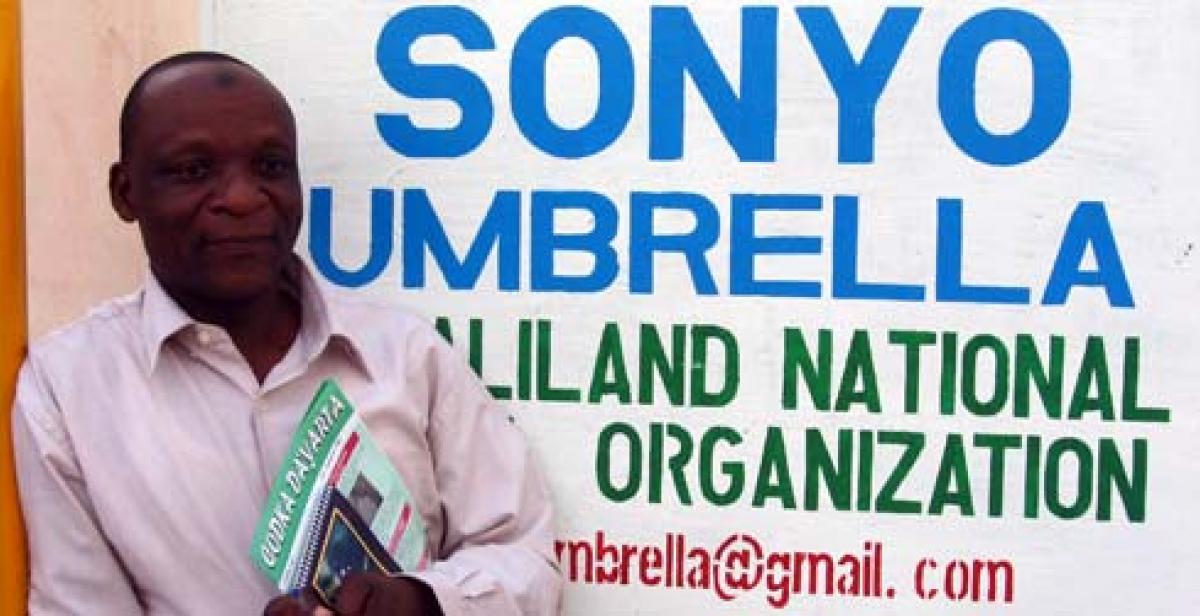Eliezer during his placement in Somaliland.
Eliezer Wangulu, from Kenya, was a Development Worker with Progressio from April 2004 to May 2008, in Zimbabwe and Somaliland.
Please describe your role and the partner organisation that you worked with as a Progressio Development Worker
From 2004 – 2006, I was placed with the Southern Africa HIV and AIDS Information Dissemination Service (SAfAIDS) in Harare. I was a Media Adviser and then Publications Manager. My work entailed writing and editing SAfAIDS and their partners’ publications on HIV and AIDS, sexuality and gender. In addition, it was my responsibility to monitor the impact of the publications in southern Africa and build the capacity of my counterpart at SAfAIDS.
From 2006 – 2008, I then worked in Hargeisa as a Media Adviser focusing on HIV and AIDS with various civil society organisations, enhancing their media skills.
What inspired you to become a Development Worker?
I had a passion for communicating HIV messages and so the Progressio placement in Zimbabwe was an opportunity for me to do that. Another reason was the opportunity to work outside Kenya.
What struck you most about Progressio’s Development Worker model/approach?
One, the opportunity to work in another country, and two, working with a counterpart so that the Development Worker imparts skills to the partner organisation.
What did you enjoy most about your role, and of your experience as a Development Worker?
I enjoyed sharing my skills and experiences with the host organisation. I also enjoyed the bi-annual Development Worker meetings. It is through them that we got to share the valuable experiences of the various Progressio Development Workers at their partner organisations.
What were some of your main achievements while working as a Development Worker?
- Advising SAHAN, SONYO, HYDA and SHARA (in Somaliland) on effective communication and helping them implement their communications strategies.
- Organising a national workshop for journalists on effective reporting of HIV and AIDS in Somaliland and generally building the capacity of journalists in the country.
- Helping found a national network of journalists reporting on HIV and AIDS in Somaliland (SHARA).
- Contributing articles for publication in Progressio’s newsletter Interact.
- Most importantly, the satisfaction gained while serving humanity.
And what were some of the key challenges and lessons learnt?
My key challenge was at SAfAIDS. The organisation was going through change and half of the staff had been retrenched. Due to a lack of capacity, I worked as an employee and not as an adviser. However, I was able to learn a lot at SAfAIDS in the course of my placement. I had been a journalist per se but working at SAfAIDS introduced me to programmes’ work.
In Somaliland, the main challenge was that the capacity of the journalists was very low, so I was building their capacity, as it were, from scratch.
Did this experience change you as a person in any way? If so in what way(s)?
I am now comfortable in doing media-related programmes work courtesy of the experience I gained while at SAfAIDS. It is the international experience given by Progressio that enabled me to move on to a higher position at the Royal Tropical Institute, in Amsterdam.
Did your experience as a Development Worker influence your career/ future direction, and help you to get to where you are today? If so, how?
The experience of working in Harare and Hargeisa definitely enabled me to get the position of Managing Editor of the magazine Exchange on HIV and AIDS, Gender and Sexuality at the Royal Tropical Institute (KIT) in Amsterdam, where I worked from 2008 to 2013. I am now working as a consultant based in Nairobi.
My experience with Progressio helped me to globalise. I see myself now as a world citizen.
What advice would you give to someone who is thinking of becoming a Development Worker?
I would definitely advise you to become a Development Worker. By becoming a Development Worker, you get an opportunity to serve humanity outside your country, and in the process get international exposure.



